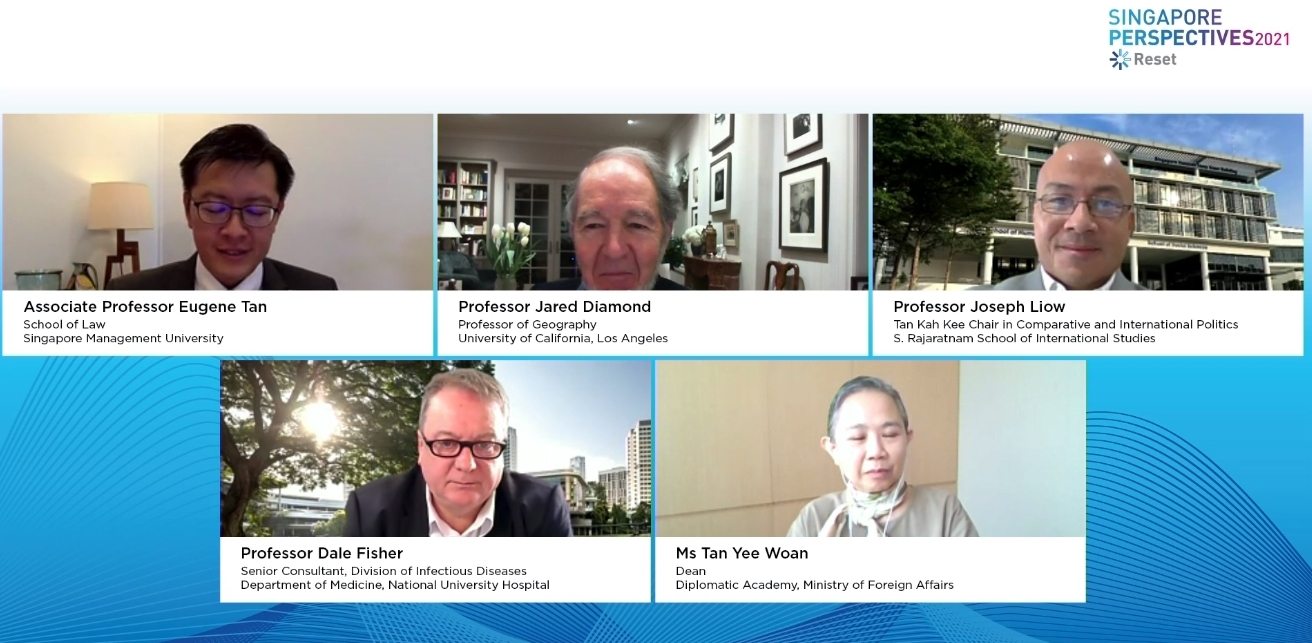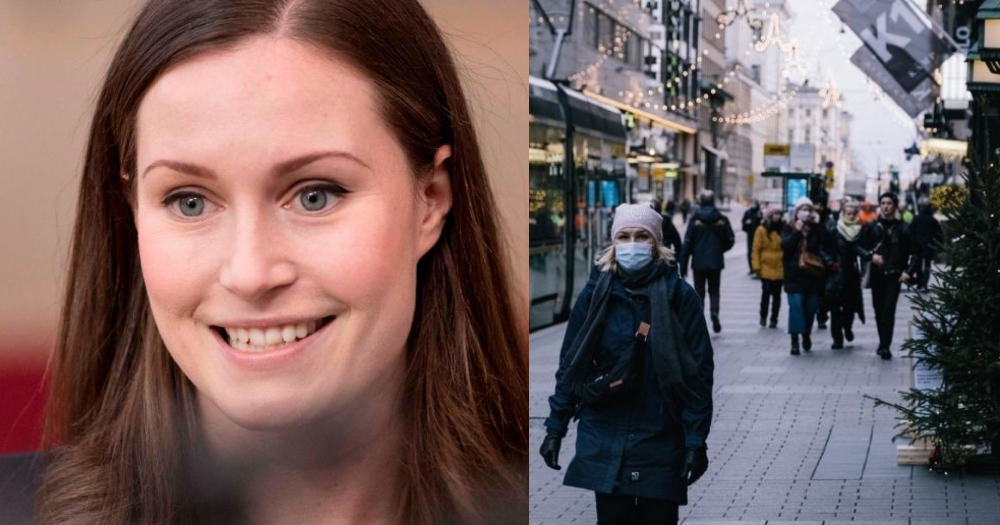Follow us on Telegram for the latest updates: https://t.me/mothershipsg
Singapore and other countries should learn from Finland when it comes to being prepared for every crisis, Pulitzer Prize-winning geographer and historian Jared Diamond said on Tuesday, Jan. 19.
The Finns prepare for "everything"
Speaking at one of the virtual forums in the Singapore Perspectives conference organised by the Institute of Policy Studies (IPS), Diamond said the world was not prepared for Covid-19 despite the fact that it should.

This is because there have been emerging diseases before, such as SARS, which was transmitted through animal and human contact -- the same mechanism as Covid-19.
Diamond, who is the author of global best-selling book "Guns, Germs, and Steel: The Fates of Human Societies", then raised the positive example of Finland.
He said the Finns have a practice of "being prepared for everything" due to reasons such as their "bad experience" in World War Two when they were attacked by the Soviet Union. He added:
"Their connections to the outside world were cut off, and ever since then, the Finns have thought of everything that can go wrong, and they prepare for it."
Elaborating on the northern European country's readiness to tackle unexpected emergencies, Diamond said one of his friends is on a Finnish government commission that meets monthly just to "think of anything that could go wrong".
Topics can range from the breakdown of electricity, to the failure of the financial system, to the end of food imports.
And since the Finns plan for everything, naturally, they have planned for an epidemic, he said.
Without knowing that Covid-19 was to come in the future, several years ago, the monthly commission had considered the possibility of the spread of a disease to Finland, which resulted in them having sufficient supplies of face masks, fuel and food.
"The Finns are prepared for everything," Diamond said. He continued:
"In that respect, Singapore, the U.S. and every country in the world should imitate the example of Finland, and consider everything that can go wrong and plan for it."
Very expensive to be unprepared
Diamond then took a question from the audience, which asked how the Scandinavian country was able to sustain and justify the resources expended to "anticipate every threat".
In response, he explained that it is "surprisingly cheap" to be prepared for everything, and "very expensive" to be unprepared.
"Finland has supported its stockpiling of everything by a small tax on petrol, on gasoline. The tax is trivial; it's a fraction of a few cents per litre of petrol. The cost is very slight," Diamond elaborated.
He added that as his country, the U.S. discovered in February last year, the lack of stockpiles of toilet paper and other affordable necessities resulted in toilet paper running out in the supermarkets and the cost of a single face mask shooting up to US$8 (S$10.60).
"So we discovered, it's very expensive to be unprepared, and it's cheap to be prepared," he reiterated.
Covid-19 is a global risk that requires global cooperation
This is one of the two lessons that the Covid-19 pandemic has taught the world, according to Diamond.
The other lesson was that Covid-19, being a global risk, has taught countries about the importance of global cooperation to tackle it.
Diamond explained that as with other global risks such as climate change and resource depletion, no country is going to be safe against Covid-19 unless the whole world is same against Covid-19.
Taking the example of Singapore, he added that there is no way the city-state can eliminate the risk of Covid-19 for itself as it would just get reinfected by its neighbours in a matter of "days".
As for the U.S., it also cannot achieve security against the fast-spreading disease "until the whole world is safe", he said.
"Covid-19 is a global risk that demands global cooperation," he stressed.
Covid-19 caught the world's attention even though it's not the most serious threat globally
Diamond went on to say that although Covid-19 is not even the most serious risk facing the world, it has gained a disproportionate amount of attention globally as it kills people faster than other threats.
While the "worst" that Covid-19 could do is to kill 2 per cent of the world's population, which is around 150 million people, and that is "a huge tragedy", there are bigger threats out there, he said.
These are climate change, resource depletion, which is the exhaustion of the world's forests, fisheries, top soil, and even freshwater supply, as well as inequality around the world, which makes people in poor countries "angry and jealous and prepared to vent their anger on rich countries", he opined.
But while these big threats affect us more, they have not elicited a greater demand for global cooperation.
This is because as compared to Covid-19 which kills more quickly, climate change takes years to kill, he said, adding that when a person dies of climate change, people say that the person died of a tsunami, or famine or disease spread that was a consequence of climate change.
Diamond then expressed his hope that Covid-19 will "galvanise the attention of the world to take seriously these big threats."
Countries fought one another instead of fighting the pandemic
Joining in the panel discussion was Dale Fisher, a senior consultant in the Division of Infectious Diseases at the National University Hospital (NUH), who opined that Covid-19 has "exposed a lot of what we do badly on the planet".
Calling it "the great revealer", he said Covid-19 has shown "overcrowded accommodations such as dormitories, homeless shelters, prisons" to be high transmission points.
"As a colleague of mine once said, if you can't find your weak spot, Covid will find it for you," he added.
He also expressed his disappointment towards "poor leadership, poor coordination, and the inability of governments to cohesively work together".
Elaborating on this point further, he criticised how some countries prioritised fighting one another instead of fighting the pandemic.
"Even state leaders within some countries started to turn on each other, blame the other state, shut the borders, criticised their contact tracing efforts... of course, this really helps no one in this environment," Fisher said. He added:
"In Liberia, during the Ebola outbreak, we were really ambitious that in the wake of the Ebola outbreak we would see hospital standards improve, infection control levels rise. But unfortunately... you end up going back to the way it was afterwards."
Countries shut their doors just as Covid-19 struck the world
Joseph Liow, the Tan Kah Kee Chair in Comparative and International Politics at the S. Rajaratnam School of International Studies, expressed a similar opinion as well.
Despite a serious demand for global cooperation, Liow pointed out that the initial reaction for many states as the pandemic struck the world was to shut their borders.
This reaction was in spite of the numerous multilateral agreements signed among states to prepare for future pandemic outbreaks countries after SARS and Ebola, he said.
And while he acknowledged that after this initial period of shutting down borders, "numerous agreements have materialised", he said the point remains that the international community had failed to come together "during the critical first couple of weeks of the outbreak".
This has caused a hefty price for humanity, he said.
Adding that there is a gap between rhetoric and practice, Liow opined that multilateralism is not perfect, and that people must guard against unrealistic expectations by recognising its challenges.
He concluded that while certain aspects of the multilateral system are in need of repair, global cooperation is still paramount for countries, especially for small states such as Singapore.
Need for global cooperation will only increase
Tan Yee Woan, Dean of the Diplomatic Academy at the Ministry of Foreign Affairs (MFA), said that the need for global cooperation will only increase over time.
However, she added that the current state of the world, where countries are "being forced to choose sides" in the U.S.-China great power competition, does not help the world progress towards greater global cooperation.
Tan cited how the former Soviet Union and the U.S. eradicating smallpox in the last century as an example that strategic competitors are able to work together to achieve good outcomes for themselves and the global community, if they want to do so.
"Multilateralism had never been plain-sailing, and had always contended with nationalism, protectionism among others," she said, adding that "many international organisations are not as effective as could be wished for." She continued:
"But even though they are not as effective, quite a few of them have important mandates that continue to be relevant."
Singapore relies heavily on global cooperation
Lastly, expounding on Singapore's role in global cooperation, Diamond said multilateralism is key to Singapore in two ways.
First, the country exists through global cooperation and also relies heavily on that for its well-being, he explained.
Perhaps more than any other country in the world, Singapore thrives on trade, and gets much of its water and food from its neighbours, he said, adding that the city-state even gets its climate from surrounding countries, such as forest fires.
Second, with "perhaps the most outstanding public health programme in Southeast Asia", Singapore can serve as a model to its neighbours for solving problems, including Covid-19, he said.
Diamond further said there have been successful instances of global cooperation, such as the WHO eliminating smallpox, which he said was "the most feared disease of history 40 or 50 years ago".
The global health body is now in the process of eliminating polio, he added.
Concluding his address on a rather optimistic tone, Diamond said: "Covid is a tragedy, but it's a tragedy that brings hope -- a sentiment that Fisher expressed as well when he said he would be "delighted" if Covid-19 would see the world "mature".
"It may be that the millions of deaths from Covid that the world has suffered so far will inspire the world. Recognising that Covid is a global problem that requires global cooperation... perhaps that will finally inspire the world to take action against the really big global problems."
Totally unrelated but follow and listen to our podcast here
Top image adapted via Getty Images
If you like what you read, follow us on Facebook, Instagram, Twitter and Telegram to get the latest updates.
